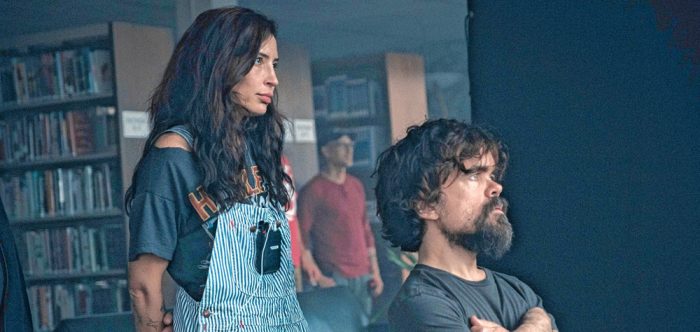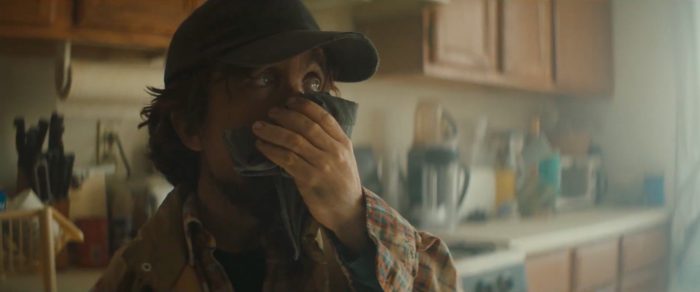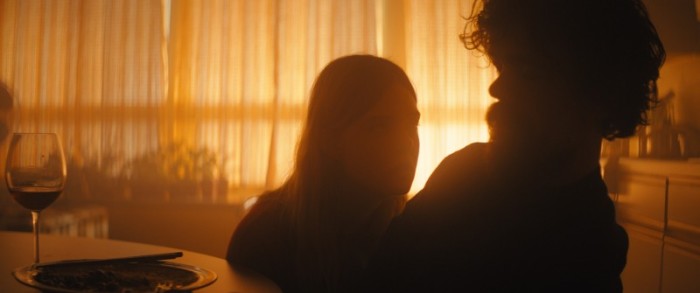
I Think We’re Alone Now has been in limited release since last weekend, but the rest of the country will get a chance in the coming weeks as the film expands to more theaters. However, fans of Game of Thrones star Peter Dinklage, actress Elle Fanning and/or post-apocalyptic movies may be surprised by the tone director Reed Morano struck with her Sundance selected feature.
Morano has been an acclaimed cinematographer of movies like Frozen River and Beyonce’s Lemonade. She’s won acclaim as a director for the pilot that launched The Handmaid’s Tale into a Hulu phenomenon, so there’s been a lot of anticipation for her follow up feature. Morano spoke with /Film by phone about what drew her to Mike Madowsky’s script for I Think We’re Alone Now and why she was never, ever going to use the pop song of the same name in the film.
Before we get to the interview, here’s the trailer for I Think We’re Alone Now:
Del (Dinklage) is the last survivor of an apocalypse in his town. He spends his days going house to house looking for supplies. One day Grace (Fanning) shows up breaking his routine and forcing him to be social, which he was never even good at before the world ended.
My favorite obscure subgenre of film is this post-apocalyptic genre where the last survivors search the world for supplies. Do you share the same fetish for that as I do?
It appears so, but it’s interesting because I wonder if it’s some sort of subconscious self-preparation thing. Now I feel like I learned about the very first stops, the very first places I would go the moment I’m realizing there’s been an apocalypse.
As I Think We’re Alone Now points out, batteries are the most important thing to find first and foremost.
Yeah, we had to figure that out. That was a big focus in the script about the batteries and it’s true. You’ve got to look and see what would you be left with and how would you utilize the power that you have left? Really, it does come down to batteries. The most valuable assets are batteries and gas pretty much.
Does it add a layer that Del lived in that town, so every house he searches is a story he knows?
I think he knows most of them and that’s what’s interesting. He’s kind of like an encyclopedia of the people. That’s interesting when he’s in that first house and she’s like, “Who is this?” I think he knows the people anyway because it’s a small town and he works in the library, so anyone he passed through there, he took note. He’s like a cat hoarder. He’s very OCD and meticulous and observational. I think he kept tabs on everyone.
If it was specified, I’m sorry I missed it, but did you decide how long it’s been?
Yeah, there wasn’t a specific time period in the script, but I had to decide how long it’s been. Sometimes in a script you can write a story and you don’t have to write in all the details. That’s one of the things I loved about Mike’s restraint as a writer. He didn’t dictate every little thing. He sets up an awesome situation and he does give very particular details but other details that are pretty huge, he leaves out for us to fill in the blanks.
Of course, when you’re directing, you have to answer to the actors. You have to answer to all your department heads. You have to answer to everyone and it all has ramifications. You can say, “There’s a dead body here” but when you actually put the dead body on screen, you have to know how decomposed it is if you actually care about accuracy. Therefore I had to answer that question, how long has it been since this happened? We decided about a year and three months. We did some calculations. How long has Grace been on the road? What’s the longest it could be where the bodies still look human? That’s the other thing. I didn’t want them to look horrifically disgusting. I wanted them to still be recognizable as humans that have died. That was the last moment that could be that.
Did you make any changes to I Think We’re Alone Now after Sundance?
No, I didn’t. We didn’t have any money to, but I also don’t think I would have. You go down a path and sometimes you’re too far down the path. For me it would’ve been little things, like I want to fix a sound thing here. For me, the movie is what I want it to be. If people don’t like it, that’s okay too. It’s a divisive film on purpose. If you’re going to make something, if people are passionate that they love it, which they are, that’s great and then the people that are passionate if they disagree with some of the turns that the film takes, it’s great because that means that the movie got a reaction out of them. It’s much better for me to make something that creates a conversation than to make something that just is vanilla and doesn’t really affect people and they’re like, “Yeah, it’s fine.” I want people to walk away and either be really stoked on it or disturbed by it or pissed off by it. Any of those things is fine with me. Then I’ve done my job.

Was there ever a version where you used the title pop song?
No. That’s one thing that’s for sure. I’ll tell you what, I really love that song but it’s been the bane of my existence. I actually do think it’s a case study in how a title of a movie can really affect a person’s perception of what they think the movie should be. I do think there are certain people who have had reactions to the movie specifically because of the title being what it is. That’s a real bummer because it’s actually just a sentence before Tiffany made it a song.
Even before Tiffany. Her song was a cover.
And Tiffany’s was a cover. It was Tommy and the Shondells. I’m definitely aware of all the iterations of that song. To me, the obvious thing to me, and I like ironic use of music at times, but it felt like it was too cutesy to be like Mike named it that title, but I’m going to also now put the song in. It just felt like lazy filmmaking. Do you know what I mean? The songs I put into the movie, the source music I put into anything I do, usually does have a symbolism or parallel. I always read the lyrics and always know the lyrics and put it in on purpose to match up with the story point, but to do the title of the movie and the song, that’s my worst nightmare. I just think that’s fucking cheesy. I think anyone who thinks that’s a good idea and it’s not a movie about a band named The Commitments or something… If it’s a movie about music and it’s called the title, that’s cool. But there’s no reason for that song to be in the movie. It doesn’t go with the movie.
Yeah, I did not expect you to use the song, but now I’m glad I asked.
People got so mad. Some people, I actually thought if I had put the song in, I was certain if I put that song in, people were going to be like, “Okay, you’re dead to me as a filmmaker.” Then I learned very quickly whose taste I trust by reading certain responses to the movie where they were asking the question. “She didn’t even put the song in. The nerve.” It’s like, are you a simpleton? It’s so crazy to me. Why would I do such a thing? It’s the worst move of all time. It’s lazy filmmaking, it’s cheesy and too cute. It’s not the movie. I think it’s funnier to put that title and be like it’s totally fucking not what you thought it was. Sorry, joke’s on you.
I think I could also tell it wasn’t going to be a happy movie.
Right. It’s cool I think to have a contrasting vibe with the title. I don’t think it’s the worst thing in the world, but the movie does a lot of unexpected things which is what I love about it. A lot of those things were things that were in the script and what drew me to the project in the first place and why I love Mike Makowsky. He makes some really weird choices and I’m like, “Who is this guy?” He’s like the Doogie Howser of screenwriters. He is brilliant and he’s got an off brand sense of humor that’s totally up my alley. I think he’s going to start a trend. People may not be ready for it fully yet but I think there’s a lot of people that told me they’re into it so that’s cool.
As a cinematographer, how did you want the apocalypse to look compared to other portrayals on film?
Pretty. No, I think there’s a lot of gorgeous post-apocalyptic movies. I think it’s always if you’re going to do something, try to bring something new to the table, unless you’re specifically doing an homage to something. I just thought I want it to look oddly beautiful and slightly heightened, but also naturalistic and naturalistic lighting and a softness to it. It’s a very harsh scenario. So there is something nice and sort of dreamy about the lenses that we used and the way we lit it and light coming through these gauzy curtains. It sort of feels cozy at times even though it’s a very cold, and when you’re outside it’s pretty cold, but there is a rose colored glasses kind of effect to it. It just feels different than other ones but I think it’s also because Del was happy. He was having the opposite reaction to the apocalypse compared to other protagonists.

As a director of photography, do you have ways you prefer directors to work on set that you were then able to do as the director?
Yeah, having worked with a lot of directors over the years, there are a wide range of methods. Everybody is super different and the one thing I take away from the directors I’ve worked with that are really close friends still to this day is there’s a respect they all had for everyone working for them, and for the actors. I’ll tell you that not all directors are like that. They don’t all have respect for their crew and they don’t all have respect for their actors. I’ve worked for quite a few people who actually, believe it or not, are like that. For me, it would be unnatural to do it any other way. Coming from the crew, I can only appreciate everybody who is tirelessly working to make my dream become a reality. It feels so selfish. It feels like you’re having my super sweet 16 every day and everyone’s buying you tons of presents. Everybody’s there for you. Of course they’re being paid but it’s a very magical thing. That’s the thing I take. I don’t know about specific directing methods per se. I’m sure things have rubbed off on me but it was kind of a mystery to me. Most directors I worked with, I wasn’t 100 percent sure all the time what they were doing to get the performance they were getting, because oftentimes those conversations are off to the side and whispered. I had the occasional director that would scream direction across the room which is also entertaining. Not my method but pretty hilarious, and that’s another director I really love.
Was directing always your long-term plan when you got into the business?
I went to film school, undergrad and I did go to film school to direct initially because I had written stories all during my childhood. Then I got into photography and I got into video and filming. I didn’t go to film school thinking I’m going to be a cinematographer. I went to film school thinking I’m going to make movies, which is what a cinematographer does ultimately. I think a fortunate turn of events was that when I got to film school, I quickly realized that I had a very strong interest in holding the camera, physically holding it in my hand and being in control of it. To me, at that point, it just felt like that person, whatever they’re seeing, the audience is seeing it through their eyes and I just want to be that person. That natural, organic growth process in filmmaking was perfect because I don’t think I was ready. I did direct a few films in film school but I just didn’t have a lot of life experience to really be a good director. There are very few filmmakers, and we can count them probably one one hand, who at such a young age come out with this profound filmmaking ability. Anyway, I did not portend to think I was ready to do that. I was just like hey, I’m going to hook up this camera and light the scene and go on all these other people’s adventures. Hopefully, at some point, I’ll be able to do my own and I’ll know when that right time is. Eventually that time came and it was probably after a lot more things had happened to me to give me some life experience.
Would you ever hire a different director of photography (DP) when you direct?
I have. I like it because I love DPs. I think my closest friends are DPs actually. Many of my closest friends in the business are other DPs because we really understand each other and it is a rare collaboration that not many people can get where a DP can work for another DP. Also, what a treat for cinephiles who appreciate cinematography to be able to see a movie that two DPs have affected the look, because you’re going to get a result that is a hybrid of the two DPs. For me, working on Handmaid’s Tale, I had hired Colin Watkinson who shot The Fall to be my DP. I was obsessed with that movie years before, so finally I was able to [work with him].
That’s the other thing. I can hire my idols. Colin and I worked together and what’s great is, DPs that I choose to work with are really on board with trying to interpret my vision, but also while keeping some of themselves in it. That’s the cool part. Then it becomes both of us. I worked with Sean Bobbitt on the movie I just finished shooting called The Rhythm Section. Sean Bobbitt’s incredible. He shot 12 Years a Slave, Hunger and Shame. He’s an amazing person as well with an amazing eye. It’s also a support system you have when you have another person that’s a DP on set. They look out for you and they take care of stuff so you don’t have to. It’s sometimes easier in many ways. Also it’s just a camaraderie that I love but then I also love doing it on my own because there’s a gratification that comes with that, an artistic gratification that sometimes I need to scratch that itch.
Is The Rhythm Section a kick-ass action movie?
It’s a kick-ass movie and there is a lot of action in it. It’s also a psychological thriller and a drama. It’s a whole bunch of things rolled into one. I think one thing’s for sure, that people are not going to get just a straightforward action movie. That’s for sure, but it’s a special movie with an amazing team of people that were like, “I don’t know what you’re doing but I’m along for the ride.” I think it’s going to be pretty cool.
Are you also developing two Holocaust era projects, Keeper of the Diary about Anne Frank’s father and a My Favorite Thing Is Monsters adaptation?
Keeper of the Diary I am directing. That will happen sometime hopefully in the next year. Very cool story because we haven’t really told that story of the people that are left behind, Anne Frank’s father and how he made it his life’s mission to make her a known writer posthumously. My Favorite Thing Is Monsters, I’m not sure where I’m at on that one but I love the book so much. I do have a plan to do it and ihopefully I’ll be able to still make that plan happen.
I Think We’re Alone Now is playing in select theaters now.
The post Why ‘I Think We’re Alone Now’ Director Reed Morano Avoided That Song In The Movie & More [Interview] appeared first on /Film.
from /Film https://ift.tt/2zn36Hu
